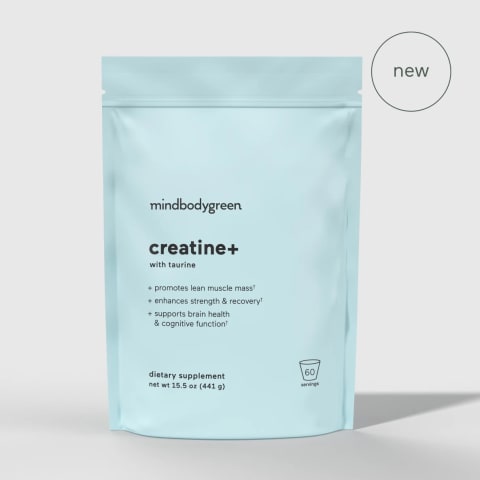Advertisement
Improve Blood Sugar, Blood Pressure & Triglycerides With Taurine, Study Shows


Only 12% of adults1 in the U.S. are considered metabolically healthy. Meaning: All five commonly accepted markers of metabolic health are within the normal range without the use of medication: fasting blood sugar, high-density lipoprotein (HDL cholesterol), blood pressure, triglycerides, and waist circumference.
So most people have a lot of room for improvement. While diet and exercise play an outsized role in improving metabolic health, so can individual nutrients. A new sweeping study found that the amino acid taurine is one to watch2.
Here's what you need to know and whether increasing your taurine intake is right for you.
What is taurine?
You may be familiar with taurine from seeing it on the labels of energy drinks—yes, it is a popular energy drink ingredient (thanks to its role in cognition and energy production). But you also get it from foods (namely shellfish and dark meat), and it's one of the most abundant amino acids in the human body.
But unlike other amino acids, this one isn't incorporated into building muscle or connective tissue. Instead, it's vital for mitochondrial health (and therefore energy production).
It may have positive effects on metabolic health as it helps regulate fluid and electrolyte balance (important for blood pressure), support insulin sensitivity, tame inflammation, and influence how the body uses and stores energy from carbs and fat.
All of these actions combined prime this nutrient for metabolic support3.
Taurine may improve metabolic syndrome
Researchers of this new study analyzed data from 25 randomized controlled trials (including over 1,000 individuals) that looked at taurine use2 (via a supplement) and those five markers of metabolic health.
The dose of taurine wasn't consistent across all of these studies and ranged from 0.5 gram to 6 grams daily.
Overall, results showed that taurine supplementation significantly lowered:
- Blood pressure
- Blood glucose
- Triglycerides
How to get more taurine
As mentioned, taurine is obtained through the diet via animal protein, and the average adult typically gets around 40-400 milligrams4 from food each day (likely on the lower end if you follow a predominantly plant-based diet).
But it's still below the lowest end of the threshold associated with these therapeutic benefits. So if you want to reap taurine's full benefits, a supplement is the way to go.
Consider looking for an option that provides around 2 grams of taurine5 in each serving. And this amino acid pairs great with creatine.
That's because creatine is extremely helpful in building lean muscle (when combined with strength training, of course). Having more lean muscle mass6 is linked to improved metabolic health.
Together, they're the perfect combo to supplement and get the most out of other metabolically healthy habits.
The takeaway
Although taurine may not be a household name yet, it likely soon will be as research is continually published7 showing its benefits.
This latest systematic review and meta-analysis revealed that this amino acid consistently improved multiple markers of metabolic health to increase a person's chance of chronic conditions like heart disease, Type 2 diabetes, and nonalcoholic fatty liver disease.
If you feel like you're already doing everything right when it comes to blood-sugar-balancing habits (like diet and exercise), adding more taurine to your routine may give you the edge you're looking for.
7 Sources
Watch Next
Enjoy some of our favorite clips from classes
Enjoy some of our favorite clips from classes
What Is Meditation?
Mindfulness/Spirituality | Light Watkins
Box Breathing
Mindfulness/Spirituality | Gwen Dittmar
What Breathwork Can Address
Mindfulness/Spirituality | Gwen Dittmar
The 8 Limbs of Yoga - What is Asana?
Yoga | Caley Alyssa
Two Standing Postures to Open Up Tight Hips
Yoga | Caley Alyssa
How Plants Can Optimize Athletic Performance
Nutrition | Rich Roll
What to Eat Before a Workout
Nutrition | Rich Roll
How Ayurveda Helps Us Navigate Modern Life
Nutrition | Sahara Rose
Messages About Love & Relationships
Love & Relationships | Esther Perel
Love Languages
Love & Relationships | Esther Perel
What Is Meditation?
Box Breathing
What Breathwork Can Address
The 8 Limbs of Yoga - What is Asana?
Two Standing Postures to Open Up Tight Hips
How Plants Can Optimize Athletic Performance
What to Eat Before a Workout
How Ayurveda Helps Us Navigate Modern Life
Messages About Love & Relationships
Love Languages
Advertisement

Want To Lower Your Resting Heart Rate? Get More Of This Nutrient
Molly Knudsen, M.S., RDN

3 Reasons Women Should Take A Creatine Supplement In Menopause
Molly Knudsen, M.S., RDN

Want To Lower Your Resting Heart Rate? Get More Of This Nutrient
Molly Knudsen, M.S., RDN















